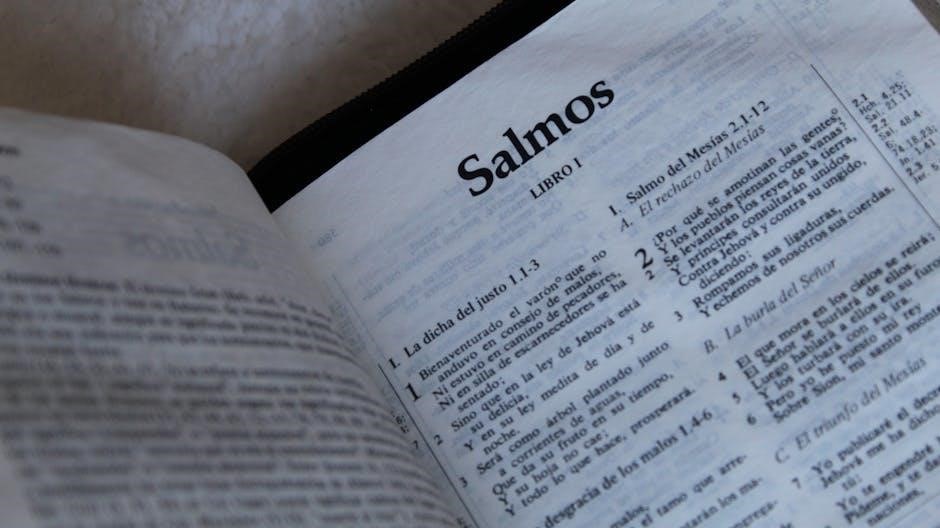The Book of Psalms is a timeless collection of sacred poems and songs, reflecting deep spiritual insights, emotional expressions, and divine connections, shaping faith and worship across generations.
1.1 Significance of the Psalms in the Bible
The Psalms are a foundational collection of prayers, hymns, and meditations, expressing the full range of human emotions and spiritual experiences. They serve as a worship guide, reflecting Israel’s history, hopes, and faith in God. Jesus and the New Testament authors frequently referenced the Psalms, highlighting their enduring theological and devotional significance for believers across generations.
1.2 How to Approach Studying the Psalms
- Begin by understanding the historical and cultural context of each Psalm.
- Identify the type of Psalm (e.g., lament, thanksgiving, wisdom) to guide interpretation.
- Analyze key themes, imagery, and repeated phrases for deeper meaning.
- Reflect on personal relevance and application to modern life.
- Use reliable commentaries and study tools for enhanced understanding.

Structure and Organization
The Book of Psalms is organized into five distinct books, showcasing a diverse array of authors and a structured system for categorizing its 150 chapters.
2.1 The Five Books of Psalms
The Psalms are divided into five books, each ending with a doxology. The first book (Psalms 1-41) reflects trust in God’s sovereignty, while the second (42-72) emphasizes prayer and lament. The third book (73-89) explores faith amidst challenges, the fourth (90-106) focuses on God’s faithfulness and judgment, and the fifth (107-150) celebrates redemption and praise, forming a comprehensive theological journey.
2.2 Authorship and Contributions
The Psalms are attributed to various authors, with King David being the most prominent, contributing 73 psalms. Other contributors include Asaph, the sons of Korah, and Solomon. These authors, inspired by the Holy Spirit, expressed diverse emotions and spiritual truths, creating a rich tapestry of worship, prayer, and wisdom that continues to resonate with readers today, enriching faith and practice across generations.

Major Themes and Messages
The Psalms explore themes of praise, repentance, trust, and faith, offering profound insights into the human condition and God’s nature, providing comfort and spiritual guidance.
3.1 Themes of Praise and Worship
The Psalms are filled with expressions of joy, adoration, and gratitude, emphasizing the importance of worshiping God. Many psalms, like Psalm 100, call believers to shout, sing, and bow down in reverence. These themes highlight the transformative power of praise, fostering intimacy with God and unity among His people. They serve as timeless guides for personal and corporate worship, reflecting the depths of human devotion and divine connection.
3.2 Themes of Repentance and Forgiveness
The Psalms profoundly explore repentance and forgiveness, offering heartfelt confessions of sin and expressions of divine mercy. Psalms like 51 and 32 illustrate the human struggle with guilt and the longing for redemption. These themes remind believers of God’s grace and the importance of seeking forgiveness, fostering spiritual renewal and reconciliation with both God and humanity through sincere repentance and faith.
3.3 Themes of Trust and Faith
The Psalms emphasize trust and faith as core responses to God’s sovereignty and love. Many psalms, such as 23 and 46, express unwavering confidence in divine providence, even amidst uncertainty and adversity. These themes encourage believers to rely on God’s promises, fostering resilience and hope in their spiritual journey, while highlighting the transformative power of authentic faith in personal and communal life.

Types of Psalms
The Psalms are categorized into various types, including Messianic, Wisdom, Imprecatory, and Pilgrim Psalms. Each type reflects unique themes and purposes, offering insights into worship, wisdom, justice, and spiritual journeys.
4.1 Messianic Psalms
Messianic Psalms foretell the coming and mission of Jesus Christ, detailing His suffering, resurrection, and divine reign. These passages, such as Psalm 22 and 110, are foundational to Christian theology, providing prophetic insights into the life and purpose of the Messiah, and are essential for understanding the connection between the Old and New Testaments.
4.2 Wisdom Psalms
Wisdom Psalms offer practical insights into living a virtuous life, emphasizing moral principles and the pursuit of wisdom. They explore themes like justice, integrity, and the nature of humanity, often posing life’s big questions. These psalms, such as Psalm 37 and 119, guide believers in aligning their actions with divine wisdom, fostering a deep understanding of God’s will and human responsibility.
4.3 Imprecatory Psalms
Imprecatory Psalms express intense emotions, often calling for divine judgment or vengeance against enemies. These psalms, such as Psalm 69 and 109, reflect raw human feelings of anger and betrayal. While challenging, they teach about trusting God’s justice and surrendering personal vengeance, emphasizing faith in His righteous judgment over human wrath or retaliation. They remain a complex yet profound part of Scripture.
4.4 Pilgrim Psalms
Pilgrim Psalms, or Songs of Ascent, are a collection of psalms sung by travelers journeying to Jerusalem for festivals. These psalms, such as Psalms 120-134, express hope, joy, and trust in God’s guidance. They reflect the journey’s challenges and the anticipation of worship, symbolizing both physical and spiritual pilgrimage, emphasizing faith and reliance on God’s presence throughout life’s travels and trials.
Historical and Cultural Context
The Psalms reflect Ancient Israel’s worship, history, and culture, composed over centuries. They serve as spiritual expressions, influencing both Old and New Testament traditions and practices deeply.
5.1 The Psalms in Ancient Israel
The Psalms were central to ancient Israel’s religious and cultural life, serving as hymns, prayers, and liturgical songs. They were used in Temple worship, festivals, and personal devotion, expressing the community’s joys, struggles, and faith in God. These compositions, often attributed to figures like David, reflected the nation’s history, covenant with Yahweh, and hopes for divine deliverance and restoration.
5;2 The Role of Psalms in Old and New Testaments
The Psalms bridge the Old and New Testaments, serving as a foundational text for worship and theology. In the Old Testament, they were integral to Israel’s liturgical life, while in the New Testament, they are frequently quoted, particularly by Jesus, to illuminate His mission and the fulfillment of God’s promises. This continuity underscores their enduring relevance and spiritual authority for believers across centuries.

Theological Significance
The Psalms profoundly reveal God’s nature, humanity’s condition, and divine redemption, offering spiritual depth and insights into faith, forgiveness, and the divine-human relationship.
6.1 The Nature of God
The Psalms vividly portray God’s multifaceted nature, emphasizing His sovereignty, love, justice, and mercy. Through various metaphors and expressions, the Psalms highlight God as both transcendent and immanent, a refuge in times of trouble and a righteous judge who desires a personal relationship with humanity.
6.2 The Human Condition
The Psalms deeply explore the human condition, revealing the full spectrum of emotions, struggles, and experiences. They express joy, sorrow, hope, and despair, offering insights into humanity’s frailty and the universal quest for meaning, while pointing to divine grace and redemption as the ultimate response to life’s challenges and uncertainties.
Practical Application
The Psalms offer timeless guidance for daily life, providing comfort, reflection, and inspiration. They help navigate life’s challenges, fostering spiritual growth and emotional resilience through prayerful engagement and meditation.
7.1 Using Psalms in Personal Devotion
The Psalms serve as a powerful tool for personal devotion, offering comfort, guidance, and inspiration. They provide a means to express emotions, reflect on life, and deepen one’s relationship with God. Incorporating Psalms into daily meditation, prayer, or journaling can foster spiritual growth and emotional resilience. By selecting verses that resonate with personal experiences, individuals can find solace and direction, enriching their faith journey and daily life.
7.2 Using Psalms in Corporate Worship
The Psalms are a cornerstone of corporate worship, uniting believers in shared expressions of praise, prayer, and reflection. They provide a communal voice for joy, lament, and gratitude, fostering a sense of unity and shared spirituality. Incorporating Psalms into worship services through songs, readings, or responsive chants enhances the congregation’s ability to connect with God and with one another, enriching the worship experience collectively.

Study Resources and Tools
Utilize commentaries, concordances, and online databases like Google Scholar for in-depth analysis. Study guides and checklists help evaluate sources, ensuring reliable and focused research on the Psalms.
8.1 Recommended Study Tools
Essential tools include Google Scholar for academic research, study guides for structured analysis, and checklists to evaluate source reliability. Online tutorials and commentaries provide deeper insights, while concordances aid in exploring themes and keywords. These resources enhance understanding and facilitate focused study of the Psalms, ensuring a comprehensive and organized approach to your exploration.
8.2 Helpful Commentaries and Resources
Valuable commentaries and resources include online guides, literature reviews, and expert teachings. Jerry Jenkins’ 23-step process and feature article guides offer structured approaches. Abstracts and title tips enhance research clarity. These resources provide comprehensive insights, aiding in-depth analysis and application of the Psalms, ensuring a well-rounded understanding and effective study.

Key Psalms
Psalm 23 emphasizes trust in God as a shepherd, while Psalm 51 highlights repentance and forgiveness, offering profound spiritual guidance and personal reflection.
9.1 Psalm 23
Psalm 23, attributed to King David, is a cherished expression of trust in God’s guidance and care. Its imagery of a shepherd tending his flock offers comfort, emphasizing divine provision, peace, and hope. The psalm’s familiar verses, such as “The Lord is my shepherd,” resonate deeply, making it a timeless source of solace and inspiration for worship and personal reflection, embodying enduring faith and assurance.
9.2 Psalm 51
Psalm 51, written by King David after his adultery with Bathsheba, is a heartfelt prayer of repentance. It expresses deep remorse for sin, seeking forgiveness and purification. The psalm showcases David’s acknowledgment of his guilt and plea for mercy, emphasizing the need for a clean heart. Its themes of confession and divine grace make it a powerful tool for personal reflection and corporate worship, offering hope for restoration and renewal through faith in God’s compassion and redemption.

Literary Features
The Book of Psalms employs poetic devices like parallelism, metaphors, and imagery to convey spiritual truths, enriching its literary and theological depth universally.
10.1 Poetic Devices
The Psalms utilize various poetic devices such as parallelism, similes, and metaphors to enhance expression. These literary tools convey deep emotions and spiritual truths, making the text vivid and relatable. Parallelism, for instance, structures thoughts in balanced phrases, while imagery paints powerful pictures of divine majesty and human experience, enriching understanding and connection to the divine.
10.2 Imagery and Symbolism
The Psalms are rich in imagery and symbolism, drawing from nature, history, and daily life to convey spiritual truths; Symbols like the shepherd in Psalm 23 represent divine care, while images of light and darkness illustrate moral and spiritual contrasts. These elements create vivid mental pictures, deepening emotional and theological engagement with the text, and connecting readers to the divine presence and human experience.
Reflection and Discussion
Reflecting on the Psalms invites personal spiritual growth and deeper connection with God. Group discussions foster shared insights, enhancing understanding and community bonds through collective exploration of divine truths.
11.1 Reflecting on Personal Impact
Reflecting on the Psalms personally invites spiritual growth and emotional healing, offering comfort, joy, and guidance. Their timeless truths resonate deeply, transforming hearts and minds, fostering a closer relationship with God, and providing solace in life’s challenges while inspiring gratitude and praise.
11.2 Leading Group Discussions
Leading group discussions on the Psalms requires thoughtful preparation and engagement. Encourage open sharing, ask reflective questions, and guide the conversation to deepen understanding. Foster a safe environment where participants feel comfortable expressing insights and connecting the Psalms to their lives. Summarize key points and pray together, ensuring the discussion inspire spiritual growth and community bonding.
The Book of Psalms is a rich tapestry of spiritual expressions, offering timeless wisdom and comfort. Its diverse themes of praise, trust, and repentance resonate deeply with readers. As a foundational text, the Psalms inspire personal devotion and corporate worship, guiding believers in their faith journey. Their enduring relevance makes them a cornerstone of spiritual growth and reflection for generations.